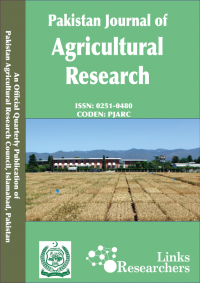Sarfraz Ahmad, Shaista Koukab, Nayyar Razzaq, Muhammad Islam, Aneel Rose*, and Muhammad Aslam**
ABSTRACT
In highlands of Balochistan chamomile (Microcephala lamellate (Bunge) Syn. Matricaria lasiocarpa ) is found naturally in many protected rangelands areas. However, its population is declining due to over-exploitation and un-controlled grazing. Traditionally these species are used for the treatment of fever and pain. Annual or German chamomile (Matricaria recutita L.), and perennial chamomile (Chamaemelum nobile) are the most important species all over the world due to multipurpose uses. Field experiments were conducted at Arid Zone Research Centre, Quetta to evaluate the growth and production potential of Matricaria recutita. Two crops a year are possible in highlands of Balochistan. The first production cycle starts from late February upto June and second production period is from August to November. Flowers are produced in flushes and picking is possible with 10-15 days interval. In irrigated conditions, maximum fresh and dry flower production at one flush was recorded 2783 and 763 kgha-1, respectively. The fresh and dry flower production under natural rainfall was recorded 812 and 252 kgha-1 respectively, at one flush. Matricaria recutita survived under the cold and drought conditions of highlands of Balochistan. Matricaria recutita has also shown regeneration potential on marginal lands. Commercial scale production of M. recutita is possible in highlands of Balochistan. However, further studies are required to evaluate different genotypes/varieties, essential oil contents at various growth stages, oil extraction techniques, mechanized flower picking, drying/storage techniques and cultivation practices in the existing cropping patterns.
To share on other social networks, click on any share button. What are these?







